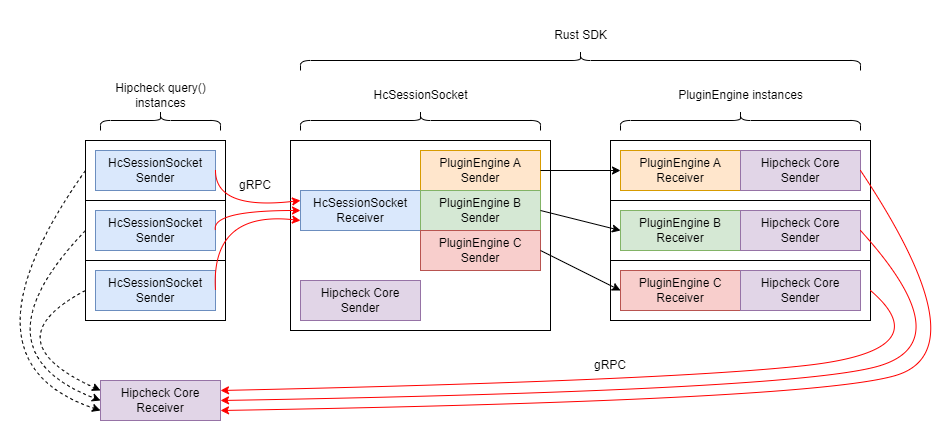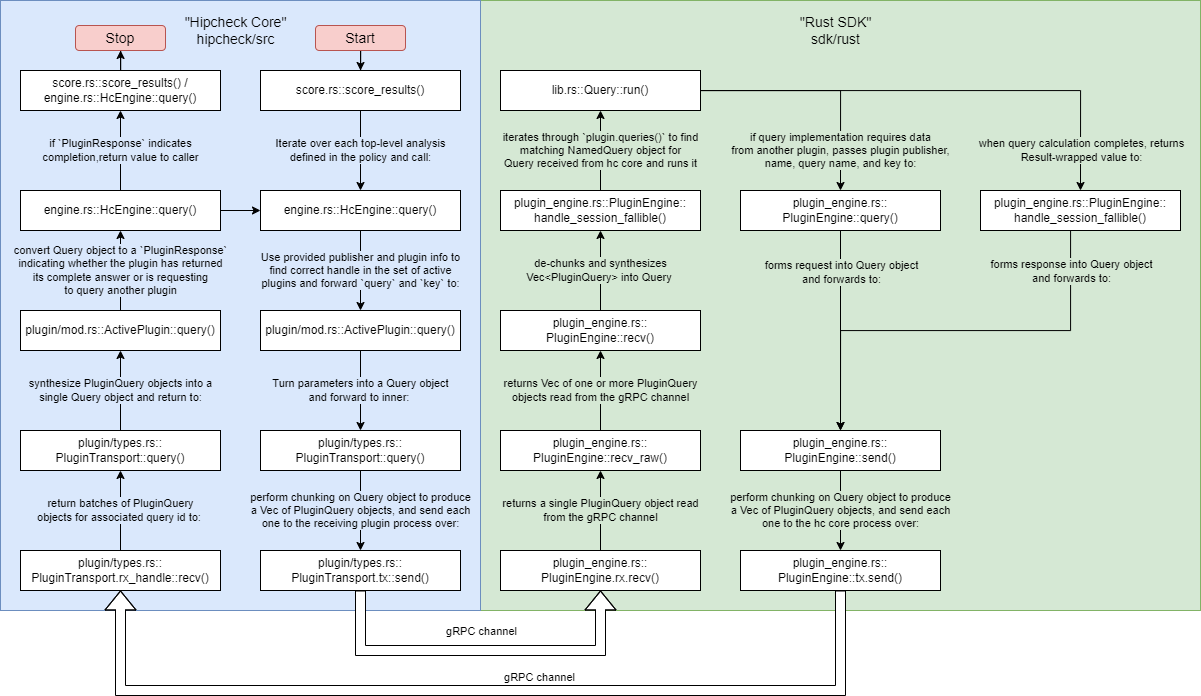Plugin Query System
This document describes the control flow through Hipcheck core, down
to gRPC, into the Rust SDK, and back to the core during a plugin
system query. This document assumes the plugins are already started and
configured, and that we have established a gRPC stream with them over which to
send and receive messages defined by our hipcheck-common/proto protobuf
schema.
Overview and Design Requirements
Hipcheck plugins are child processes of the Hipcheck core process that it communicates with over distinct gRPC channels. Each Hipcheck plugin defines a set of query endpoints that act as remote functions. They each receive a JSON- serialized key and return a JSON-serialized result. During a query endpoint's execution, it may need to invoke another plugin's query endpoint(s). All communicaton between plugins goes through Hipcheck core, so just as Hipcheck core issues a request to a given endpoint, the endpoint can ask Hipcheck core to issue another request to a different endpoint and report back the reponse so that the original endpoint can complete its own behavior.
A "session" describes the series of messages between Hipcheck core and a query endpoint needed to complete a single query. This includes those queries made by the endpoint to other plugins as part of answering the original query. Hipcheck expects each plugin to be able to handle multiple active "sessions," such that if a queried endpoint is waiting for it's own request to be responded to by Hipcheck core, the plugin process is not blocked from receiving and handling new queries, including to the same query endpoint. Thus, each query object sent to and from the plugin has a session ID field to associate it with a particular session.

In Rust, the gRPC channel is accessed with using a mpsc::{Sender, Receiver}
pair. The Sender can be cloned many times, meaning that many threads can
send messages on the channel without needing exclusive access to any resource.
However, a Receiver cannot be shared. The Rust SDK addresses this restriction
and the above multiple-session, single-channel requirement by having a
HcSessionSocket object that has the exclusive Receiver to the plugin's gRPC
channel with Hipcheck core. When it receives a message from Hipcheck core, the
HcSessionSocket determines which existing local session the message belongs
to, and forwards that message on a separate, private Sender/Receiver pair that
it has with that session. Each session is represented by a PluginEngine
instance. When the PluginEngine receives a message on its local Receiver, it
knows that the message is not intended for any other session currently executing
in the plugin. If the HcSessionSocket receives a request message that does not
correspond to any existing session, it spawns a new PluginEngine to handle the
new session and creates a new private Sender/Receiver pair for communicating
with it.
PluginEngine instances eventually have to send messages back to Hipcheck core.
Because Sender objects can be cloned, the HcSessionSocket simply maintains a
copy of the Sender for sending messages to Hipcheck core, and gives each
PluginEngine a cloned instance of that Sender. In summation, all gRPC
messages received by the Rust SDK from Hipcheck Core must go through
HcSessionSocket for demultiplexing, but each PluginEngine can send messages
to Hipcheck core on the gRPC channel directly.
hipcheck-common and Chunking
The actual type that we can send over our gRPC channel to the live plugin is
called PluginQuery, and is automatically defined by the Rust code generated
from the protobuf definitions in hipcheck-common/proto. We choose to define
this high-level Query object to allow us to control the Hipcheck-facing struct
definition. For instance, PluginQuery's state field is an i32, but for
Query we can make state a custom enum and translate from
PluginQuery.state to improve readability.
An additional complexity is that gRPC has a maximum per-message size of 4MB. To
abstract this reality from users, the hipcheck-common crate defines a chunking
algorithm used by both Hipcheck core and the Rust SDK. Each code-facing Query
object is chunked into one or more PluginQuery objects before being sent on
the wire, and on the listening side the message is de-fragemented with a
hipcheck-common::QuerySynthesizer.

Part 1: Sending a request to a plugin
The plugin query system begins with a call to score_results(), which iterates
through all the policy file's top-level analyses one-by-one. For each,
score_results() calls HcEngine::query(), which is the entrypoint for all
queries to plugins. HcEngine::query() is memo-ized using the salsa crate, so
the running hc core binary caches all queries and responses sent through
HcEngine::query(). If later in execution HcEngine::query() is called again
for the same set of parameters, it will return the cached output value without
involving the plugin process.
As described in the Overview, Hipcheck core has a unique gRPC channel with each
running plugin, so the first thing HcEngine::query() must do is find the
appropriate channel handle for the target plugin. The HcPluginCore object that
powers HcEngine under the hood (set with HcEngine::set_core()) has a map
containing all the plugin handles. HcEngine::query() keys this map using the
target publisher/plugin pair to get the appropriate plugin handle, which is an
object of type ActivePlugin. It then forwards the target query endpoint and
key to ActivePlugin::query().
Now that we have the active plugin handle, and therefore the right gRPC channel
for this query, we can formulate a query message. ActivePlugin::query()
formulates the high-level Query object and forwards it to the query()
function of the contained PluginTransport type. ActivePlugin is merely a
thin wrapper around PluginTransport with some additional state tracking
the next session ID to use.
Inside PluginTransport::query() is where the Query object gets chunked into
a Vec<PluginQuery> and each one gets sent over the gRPC channel. We have now
successfully sent out a query.
Part 2 - Receiving Queries from gRPC
Meanwhile, the plugin process (if using the Rust SDK), has been listening on the
gRPC channel with HcSessionSocket.rx::recv(). As mentioned in the Overview,
there is one HcSessionSocket instance that receives all PluginQuery messages
off the wire. Each message is returned to the HcSessionSocket::listen()
function, which determines if the message's session ID matches its list of
active sessions. If not, this newly-received PluginQuery object marks the
start of a new session, so the HcSessionSocket creates and initializes a
PluginEngine instance to handle it. HcSessionSocket creates a one-way mpsc
channel for it to forward PluginQuery objects with the appropriate session ID
to this PluginEngine. Thus, when a PluginEngine called recv() on its
channel that it shares with HcSessionSocket, it can be sure that all messages
have the same session ID. The last thing HcSessionSocket::listen() does is
forward the PluginQuery over this channel, then goes back to listening for
gRPC messages.
The PluginQuery travels up through PluginEngine::recv_raw() into
PluginEngine::recv(), where it is de-fragmentized with zero or more
other messages to produce a software-facing Query object.
If this is the first Query to a new PluginEngine, the object is
received by PluginEngine::handle_session_fallible(). The PluginEngine
doesn't yet know which query endpoint to call, so it has to match
Query.name against the output of Plugin.queries() to find the right
one. Once we have the right endpoint, we take the key (the argument) from
Query.key and call the endpoint with it.
Part 3 - Querying other plugins
Now we are actually executing query endpoint code. Over the course of its
execution, the endpoint may need information from another plugin. To enable
the query endpoint to do so, each query endpoint is provided a handle to
its associated PluginEngine along with the query key. The endpoint can then
call PluginEngine::query() with the plugin publisher and name, the target
query endpoint name, and the query key. Within PluginEngine::query(), these
parameters are formulated into a Query object and forwarded to
PluginEngine::send(). The send() function uses the chunking algorithm from
hipcheck-common to produce a Vec<PluginQuery> and send them out over the
gRPC channel Sender with PluginEngine.tx::send(). As a reminder, this does
not go back through the HcSessionSocket, the PluginEngine can send messages
to Hipcheck core directly.
Part 4 - Receiving and Interpreting Messages from Plugins
When we last left the Hipcheck core, it had just sent its Vec<PluginQuery>
over gRPC with PluginTransport.tx::send(). Note that this is just one thread
of execution in Hipcheck core. Just as a plugin process must be able to handle
multiple live sessions, the Hipcheck core may have multiple tasks each executing
independent queries. Thus, Hipcheck has the same issue of ensuring messages
received from the gRPC channel make it to the correct PluginTransport objects,
but it solves this problem differently than the Rust SDK does.
Each PluginTransport object shares a Mutex that guards the
MultiplexedQueryReceiver object. While the PluginTransport waits for a
message from the PluginEngine session that was spawned remotely to handle its
request, it enters a loop. In each iteration of the loop, it blocks until it can
acquire the MulitplexedQueryReceiver. Once it has acquired the receiver, it
checks the receiver's backlog for any messages matching its target session ID.
If none are found, it listens on the gRPC wire directly for the next message. If
the next message matches our session, we take the message, otherwise we put it
in the backlog to save it for the PluginTransport that does want that message.
After this, we drop our lock on the Mutex<MultiplexedQueryReceiver> and
restart the loop. The reason we drop and re-acquire the lock is so that one
PluginTransport that spends a very long time waiting for its message(s) does
not prevent other PluginTransport instances from receiving their messages. By
dropping and trying to re-acquire the Mutex lock, we give other
PluginTransport instances a chance to acquire the receiver.
The PluginTransport continues this loop until it has received all the
PluginQuery objects it needs to de-fragment into a Query object. It then
returns the Query to the caller, which is ActivePlugin::query(). This
function does the job of converting Query into a Hipcheck core-specific type
called PluginResponse. Until now, the Hipcheck core has not really checked the
content of the Query, but now it needs to decide whether the Query is the
query endpoint returning a value or requesting additional information. The
PluginResponse enum separates these two possibilities, plus an additional
error variant.
ActivePlugin::query() returns the PluginResponse up to the caller, namely
HcEngine::query(). Here, if the PluginResponse was Completed, we have
finished the query and return its output value that was stored as a field in
Completed. Otherwise, we have to recursively call HcEngine::query() with the
query information stored in PluginResponse::AwaitingResult.
Once this recursive call completes, we must forward the output of that query to
forward to our original query endpoint who asked for it. We do this by passing
that output to ActivePlugin::resume_query(). One of the main differences of
this function is that the generated Query object uses an existing session ID
instead of a newly-generated one, since this Query is part of an ongoing
session.
The original query endpoint may return a PluginResponse::AwaitingResult zero
or more times, but eventually we will get a PluginResponse::Completed, and by
passing the contained output up to the calling function, we have completed a
query using the plugin system!